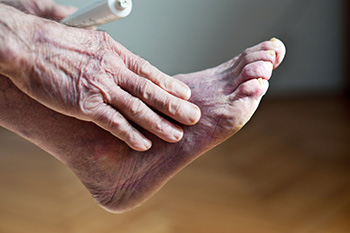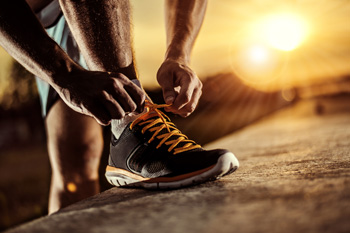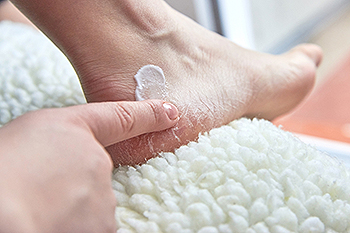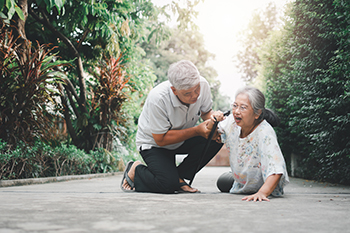Items filtered by date: April 2022
What Is Raynaud’s Phenomenon?

If you experience unusually cold feet, you may have a condition known as Raynaud’s phenomenon. This condition may simply be caused by over-sensitive blood vessels that constrict abnormally in colder temperatures. It occurs because the small blood vessels spasm and keep the blood from circulating properly. Symptoms may be triggered by a drop in the temperature, as well as anxiety or stress. In many cases no actual cause for Raynaud’s can be found, aside from a disruption in how the nervous system controls the blood vessels. In other cases, it can be linked to underlying causes. Among them are autoimmune conditions, such as rheumatoid arthritis or lupus; infections, such as hepatitis; cancer; and certain migraine, blood pressure and heart medications. Injury and overuse has been linked to Raynaud’s phenomenon, as has smoking. Please see a podiatrist for an examination to determine the cause of excessive cold feet.
Poor circulation is a serious condition and needs immediate medical attention. If you have any concerns with poor circulation in your feet contact Gary Cockrell, DPM of Tennessee. Our doctor will treat your foot and ankle needs.
Poor Circulation in the Feet
Poor blood circulation in the feet and legs is can be caused by peripheral artery disease (PAD), which is the result of a buildup of plaque in the arteries.
Plaque buildup or atherosclerosis results from excess calcium and cholesterol in the bloodstream. This can restrict the amount of blood which can flow through the arteries. Poor blood circulation in the feet and legs are sometimes caused by inflammation in the blood vessels, known as vasculitis.
Causes
Lack of oxygen and oxygen from poor blood circulation restricts muscle growth and development. It can also cause:
- Muscle pain, stiffness, or weakness
- Numbness or cramping in the legs
- Skin discoloration
- Slower nail & hair growth
- Erectile dysfunction
Those who have diabetes or smoke are at greatest risk for poor circulation, as are those who are over 50. If you have poor circulation in the feet and legs it may be caused by PAD and is important to make changes to your lifestyle in order to reduce risk of getting a heart attack or stroke. Exercise and maintaining a healthy lifestyle will dramatically improve conditions.
As always, see a podiatrist as he or she will assist in finding a regimen that suits you. A podiatrist can also prescribe you any needed medication.
If you have any questions please feel free to contact our offices located in Brentwood and Madison, TN . We offer the newest diagnostic and treatment technologies for all your foot and ankle needs.
Tips for Healthy Running
 Many people take up running to get in shape or lose weight. Running is an easy form of exercise to do, because the only real equipment you need is a good pair of running shoes. Choosing the proper footwear is essential, making sure that you consider size, fit, cushioning, and support. A podiatrist can offer advice on the correct footwear to get you started. It is also a good idea to walk before you run, easing into it with 10- to 30-minute walks before including running. Experts suggest running twice a week at first and increasing time, distance and speed incrementally. To help avoid injury, warming up before you start increases blood flow to the muscles and helps prevent cramps and strains. Afterward, be sure to stretch and cool down. If you have any specific foot or ankle problems or previous injuries, it is suggested that you see a podiatrist for guidance on how to run safely.
Many people take up running to get in shape or lose weight. Running is an easy form of exercise to do, because the only real equipment you need is a good pair of running shoes. Choosing the proper footwear is essential, making sure that you consider size, fit, cushioning, and support. A podiatrist can offer advice on the correct footwear to get you started. It is also a good idea to walk before you run, easing into it with 10- to 30-minute walks before including running. Experts suggest running twice a week at first and increasing time, distance and speed incrementally. To help avoid injury, warming up before you start increases blood flow to the muscles and helps prevent cramps and strains. Afterward, be sure to stretch and cool down. If you have any specific foot or ankle problems or previous injuries, it is suggested that you see a podiatrist for guidance on how to run safely.
Exercising your feet regularly with the proper foot wear is a great way to prevent injuries. If you have any concerns about your feet, contact Gary Cockrell, DPM of Tennessee. Our doctor will treat your foot and ankle needs.
How to Prevent Running Injuries
Many common running injuries are caused by overuse and overtraining. When the back of the kneecap starts wearing out and starts causing pain in your knee, this is commonly referred to as runner’s knee. Runner’s knee is a decrease in strength in your quadriceps and can occur if you’re not wearing properly fitted or supporting shoes. To prevent runner’s knee, focusing on hip strengthening is a good idea, as well as strengthening your quads to keep the kneecaps aligned.
What Are Some Causes of Running Injuries?
- One cause of a common running injury is called iliotibial band syndrome.
- Plantar fasciitis is also another common injury.
- Stress fractures can occur from overtraining, lack of calcium, or even your running style.
Best Ways to Prevent Running Injuries
- Wear footwear that fits properly and suits your running needs.
- Running shoes are the only protective gear that runners have to safeguard them from injury.
- Make a training schedule. Adding strengthening exercises as well as regular stretching can help keep you strong and limber and can lessen the possibility of injuries.
- Stretching keeps muscles limber; this will help you gain better flexibility.
If you have any questions please feel free to contact our offices located in Brentwood and Madison, TN . We offer the newest diagnostic and treatment technologies for all your foot and ankle needs.
Are Bunions Affecting Your Everyday Life?
Your Feet and Falling
Falling can result in bone breaks or worse, and they are especially prevalent among older people. While there are many causes of falls, such as poor eyesight, hearing, slowing of reflexes, or side effects from medication, foot problems can also impact balance and gait and result in falls. Those with diabetes or circulatory problems need to be particularly careful to examine their feet for problems they might not feel. Simple things one can do to help avoid falling include checking environments for safety hazards, wearing properly fitted and supportive footwear, staying physically active, having regular examinations of ears and eyes, limiting alcohol consumption, using canes or other assistive devices if called for, and being aware of unusual ground conditions. Meeting with a podiatrist to check your feet, help assess risks for falls, and inform you of how to minimize this from happening in the future.
Preventing falls among the elderly is very important. If you are older and have fallen or fear that you are prone to falling, consult with Gary Cockrell, DPM from Tennessee. Our doctor will assess your condition and provide you with quality advice and care.
Every 11 seconds, an elderly American is being treated in an emergency room for a fall related injury. Falls are the leading cause of head and hip injuries for those 65 and older. Due to decreases in strength, balance, senses, and lack of awareness, elderly persons are very susceptible to falling. Thankfully, there are a number of things older persons can do to prevent falls.
How to Prevent Falls
Some effective methods that older persons can do to prevent falls include:
- Enrolling in strength and balance exercise program to increase balance and strength
- Periodically having your sight and hearing checked
- Discuss any medications you have with a doctor to see if it increases the risk of falling
- Clearing the house of falling hazards and installing devices like grab bars and railings
- Utilizing a walker or cane
- Wearing shoes that provide good support and cushioning
- Talking to family members about falling and increasing awareness
Falling can be a traumatic and embarrassing experience for elderly persons; this can make them less willing to leave the house, and less willing to talk to someone about their fears of falling. Doing such things, however, will increase the likelihood of tripping or losing one’s balance. Knowing the causes of falling and how to prevent them is the best way to mitigate the risk of serious injury.
If you have any questions, please feel free to contact our offices located in Brentwood and Madison, TN . We offer the newest diagnostic and treatment technologies for all your foot care needs.
What Can Cause Cracked Heels?
 Severely cracked heels are referred to as heel fissures. They are defined as cracked skin that appears on the heels, and they can often cause pain and discomfort. This condition can occur for several reasons, including being overweight, wearing shoes that have an open back, or standing for the majority of the day. Additionally, medical conditions consisting of psoriasis or eczema may contribute to the development of cracked heels. It is helpful to wash and dry the feet thoroughly, followed by applying a good moisturizer. Cracked heels can be an unsightly, uncomfortable nuisance, and it is strongly suggested that you consult with a podiatrist if this condition is affecting you.
Severely cracked heels are referred to as heel fissures. They are defined as cracked skin that appears on the heels, and they can often cause pain and discomfort. This condition can occur for several reasons, including being overweight, wearing shoes that have an open back, or standing for the majority of the day. Additionally, medical conditions consisting of psoriasis or eczema may contribute to the development of cracked heels. It is helpful to wash and dry the feet thoroughly, followed by applying a good moisturizer. Cracked heels can be an unsightly, uncomfortable nuisance, and it is strongly suggested that you consult with a podiatrist if this condition is affecting you.
Cracked heels are unsightly and can cause further damage to your shoes and feet. If you have any concerns, contact Gary Cockrell, DPM from Tennessee. Our doctor can provide the care you need to keep you pain-free and on your feet.
Cracked Heels
Cracked heels appear unappealing and can make it harder for you walk around in sandals. Aside from looking unpleasant, cracked heels can also tear stockings, socks, and wear out your shoes. There are several methods to help restore a cracked heel and prevent further damage.
How Do You Get Them?
Dry skin is the number one culprit in creating cracked heels. Many athletes, walkers, joggers, and even swimmers suffer from cracked heels. Age and skin oil production play a role to getting cracked heels as well.
Promote Healing
Over the counter medicines can help, especially for those that need instant relief or who suffer from chronic dry feet.
Wear Socks – Wearing socks with medicated creams helps lock in moisture.
Moisturizers – Applying both day and night will help alleviate dryness which causes cracking.
Pumice Stones – These exfoliate and remove dead skin, which allows for smoother moisturizer application and better absorption into the skin.
Change in Diet
Eating healthy with a well-balanced diet will give the skin a fresh and radiant look. Your body responds to the kinds of food you ingest. Omega-3 fatty acids and zinc supplements can also revitalize skin tissue.
Most importantly, seek professional help if unsure how to proceed in treating cracked heels. A podiatrist will help you with any questions or information needed.
If you have any questions, please feel free to contact our offices located in Brentwood and Madison, TN . We offer the newest diagnostic and treatment technologies for all your foot care needs.


